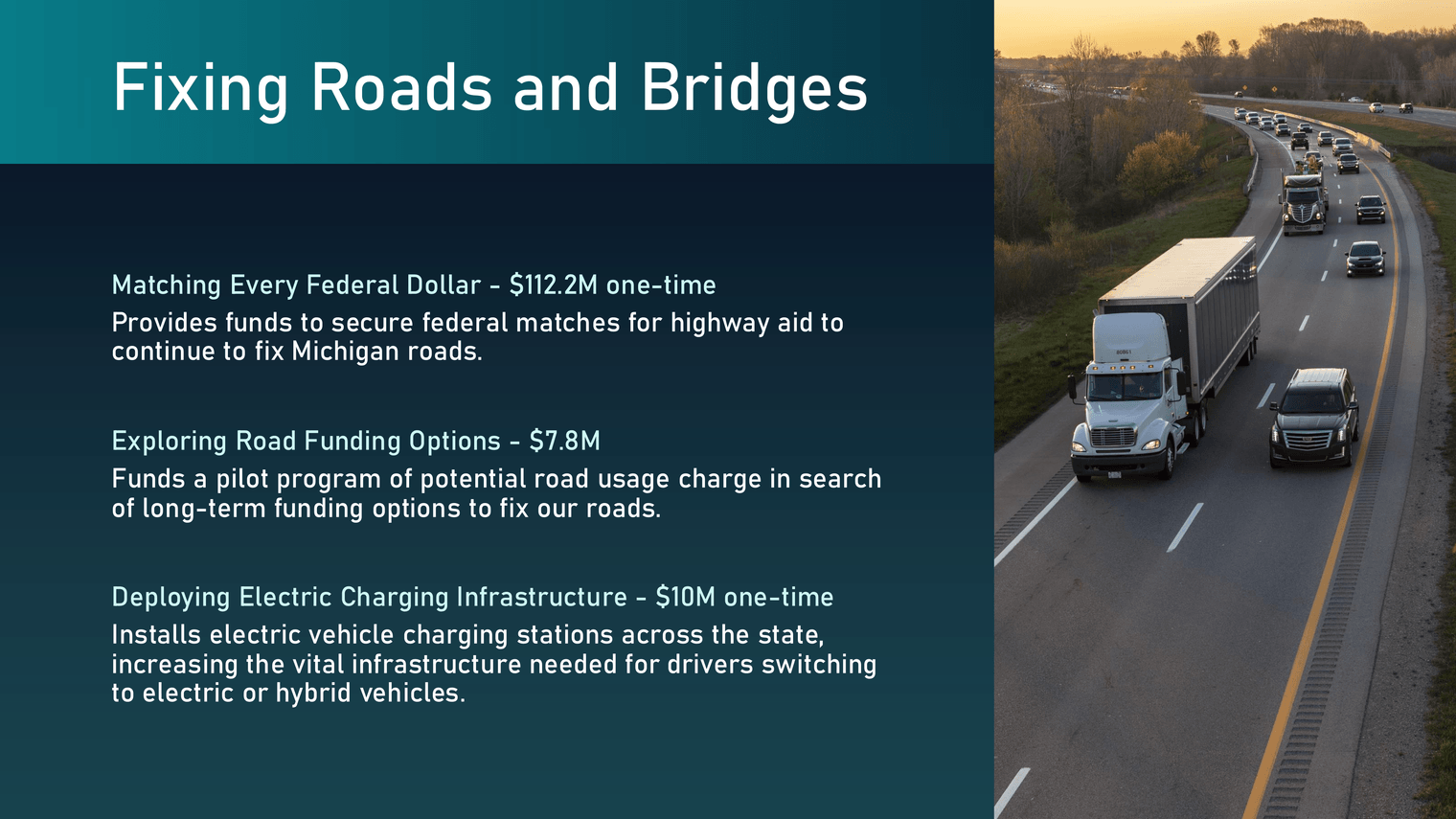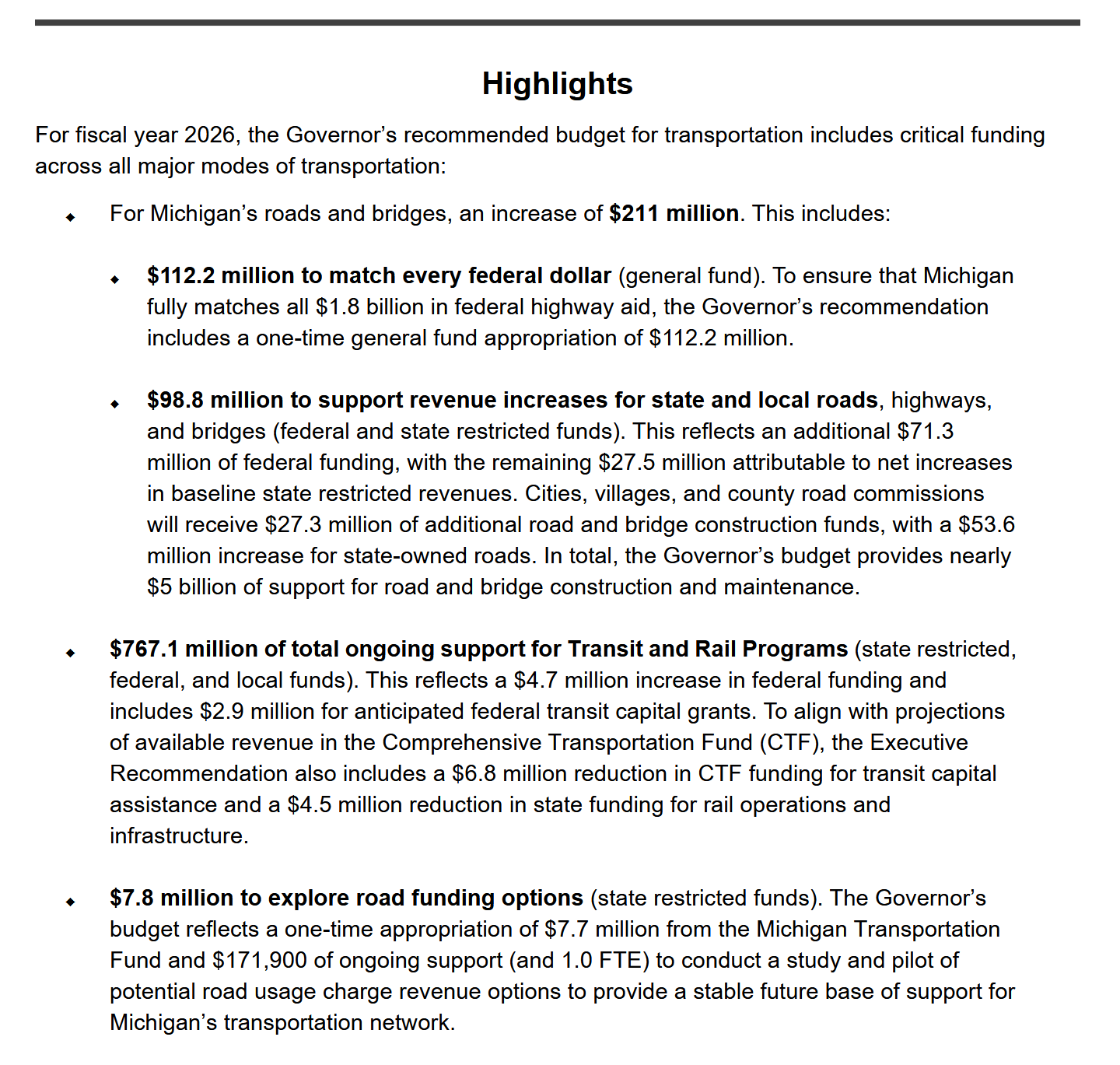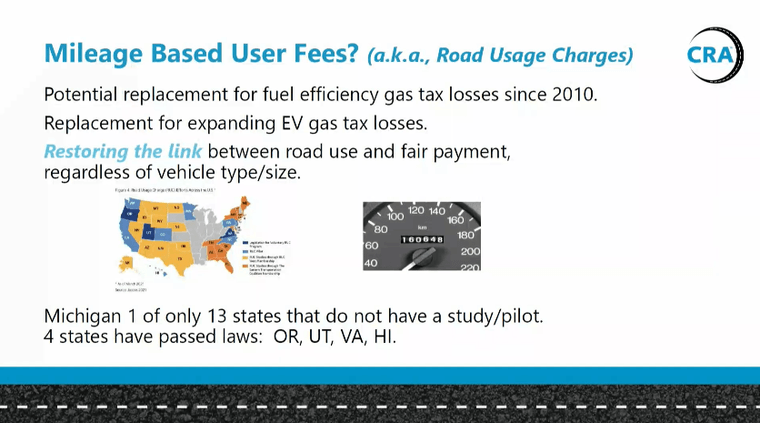103rd Legislature, Jan-Feb 2025: A New Session Begins

Long-term road funding continues to be a primary focus of the Whitmer administration and the state legislature.
The FY2025-26 Executive Budget
On Wednesday, February 5th, State Budget Director Jen Flood presented Governor Whitmer's Executive Budget recommendations before the House and Senate Appropriations committees in Heritage Hall.
In order of appearance: State Budget Director Jen Flood and State Budget Deputy Director Kyle Guerrant, Senate Appropriations Chair Anthony (D-Lansing) and House Appropriations Chair Bollin (R-Brighton), Rep. Farhat (D-Dearborn), Sen. Klinefelt (D-Eastpointe), and Rep. Morgan (D-Ann Arbor). Footage edited for time and most salient discussion; the full 90-minute budget presentation is available on Senate TV .
The Executive Budget proposes $226.75M in Local Bus Operating Assistance (LBO), which matches the level of sustained funding currently designated in the FY2024-25 budget ; however, due to the non-renewal of one-time ARPA dollars allocated last year, the budget represents an effective $20M decrease in operations funding. The state legislature will again be tasked with bridging this gap.
| Local Bus Operating Funds | FY 23-24 Enacted Budget | FY 24-25 Enacted Budget | FY 25-26 Executive Proposal |
|---|---|---|---|
| Sustained | $216.75M | $226.75M | $226.75M |
| One-Time (ARPA) | $45M | $20M | Not Renewed |
| Total (Combined) | $261.75M | $246.75M | $226.75M |
As noted by Rep. Morgan , transit funding was not specifically mentioned in this year's budget presentation. The full 2025-26 Executive proposal for the Michigan Transportation Fund (MTF), and by extension the Comprehensive Transportation Fund (CTF), will be announced the week of February 10th.

The $767M figure quoted by Director Flood is explained on page V7-3 (PDF page 88) of the FY26 Budget Book .
In short: Up to 10% of the MTF is earmarked for the CTF every year, and two-thirds of that is earmarked for operating and capital assistance to Michigan's public transit providers. If you're interested in a deeper dive, the House Fiscal Agency has published a technical summary of state formula funding along with a flowchart .
House Republicans announced their own road funding plan on Thursday.
The road usage charge study and pilot project highlighted by Sen. Klinefelt — not to be confused with the toll road feasibility study being conducted by HNTB — is highlighted on Page B3 of the FY26 Budget Book .

A road usage charge pilot remains in play for the 2025-26 fiscal year. MDOT conducted a survey in 2024 and select respondents are currently participating in a targeted six-month demonstration. Expect further discussions as the state legislature and the Whitmer administration both prepare their respective road funding plans.
The FY26 budget recommendation also designates funds for a pilot program to explore road usage charge revenue options, addressing future transportation funding needs. The recommendation proposes installing electric vehicle charging stations across the state, facilitating the transition to cleaner energy sources for automobiles.
— State of Michigan Executive Budget
Of note: Last month during an address at the Detroit Auto Show, Governor Whitmer highlighted "more investments in transit including buses and rail to boost connectivity across areas with lots of industry" as part of a five-pronged approach to supporting Michigan's auto manufacturing economy.
An excerpt from Governor Whitmer's Road Ahead Address delivered on January 15, 2025 at the Detroit Auto Show. Footage edited for time.
The bare minimum transit ask of this legislature and the Whitmer administration: Sustain current operations and Don't Let Anything Break. In light of the new federal government and as constituents of a divided Lansing, our focus must be on safeguarding Michigan against damage from loss of established funding sources and, quite frankly, loss of established freedoms.
I do still believe — and I will momentarily consider transportation in isolation from other issues in saying this — that opportunities remain to reach a bipartisan agreement at the state level which adequately supports both transit and road funding. The two are intertwined and interdependent. This will be a tentpole conversation in Michigan politics through the 103rd Legislature's tenure, and I'll be watching closely as each chamber and Governor Whitmer float their proposals for reforming our funding model.
Legislative Actions
One transportation-adjacent bill has been introduced so far: HB 4015 of 2025 , which would require toll bridges, tunnels, and any future highways in Michigan to accept cash as payment. It was referred to the House Committee on Transportation and Infrastructure on Tuesday, January 14th.
Committee reassignments
On Thursday, January 30th, committee assignments for the new legislative session were published. Senate committee assignments have not changed. A summary of changes in the House:
- The Committee on Transportation, Mobility, and Infrastructure is now simply the Committee on Transportation and Infrastructure. Membership has increased from 13 to 17 representatives.
- The Appropriations Subcommittee on Transportation is now titled the Appropriations Subcommittee on State and Local Transportation.
- Rep. Outman (R-Six Lakes) replaces former Rep. Shannon (D-Sterling Heights) as policy committee chair.
- Rep. Steele (R-Orion) replaces Rep. Puri (D-Canton) as appropriations subcommittee chair.
You might've noticed that this article says January-February instead of "Weeks 1-5" as I would've titled it under the system I used for the 102nd Legislature.
To make things more legible (and to save myself the headache of counting session days on the calendars when the House and Senate inevitably fall out of sync) I'm going to organize by months rather than by weeks for 2025-26. I don't anticipate that we'll see major transit policy introductions on a week-to-week basis like we did in the previous legislative session. While I'd be thrilled to be proven wrong, I'm expecting the bulk of the conversation in the House policy committee to revolve around road funding with transit primarily confined to budget negotiations in the appropriations subcommittees.
I've updated the legislative directory page with the complete transit committee rosters.